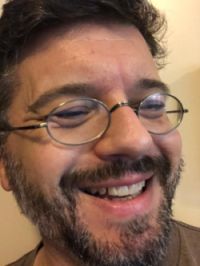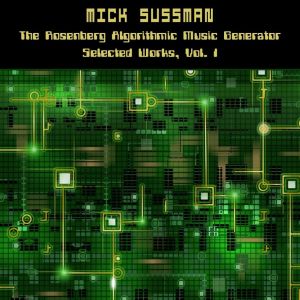
Man, Or Machine Music? [2018-07-18]Mick Sussman is an New York-based avant-garde composer- who over the last few years has created a truly huge body of complex, varied, yet playful work via the Rosenberg Algorithmic - a computer music generator designed by himself. I became aware of his work this year with the release of The Rosenberg Algorithmic Music Generator: Selected works Vol 1- which to be frank is a truly brain twisting & unpredictable sonic ride, which will be enjoyed by anyone who enjoys their musical diet both playful & brain scrambling. I tracked down Mick for an email interview.
M[m]: What are some of your earliest sonic memories, and do you think any of these influenced your interest in computer-created music?
Mick I remember my mother singing show tunes to me as a child. I probably think of that because I now have a 4-month old baby. But I don’t think this had much influence on Rosenberg because ...
M[m]: When did the idea for the Rosenberg Algorithmic Music Generator first come about? And how long did it take to realize the generator as a working tool?
Mick … I stumbled into this project. About ten years ago, I started aimlessly playing around with short splices of sampled sound. I would arrange them into phrases and then copy and paste them with slight modifications to create evolving webs of sound. It was a laborious method, but I kept at it for several years. Eventually, I decided I wanted to automate the system. I had almost no background in computer programming, but I started learning to code with Max-MSP and javascript. I took lessons from a local digital music professor. Within about six months, I had a crude version of Rosenberg up and running. That was about four years ago and since then I’ve been expanding and refining the software.
M[m]: you mention messing around with sampled sound- when did you first start creating your own sounds? And has it always been digital-focused?
Mick In the period before I started using code to make the music, I became progressively less interested in timbre and more interested in melody, especially microtonal tuning and complex rhythmic polyphony. Samples made it harder to precisely control the pitches and to keep the timbre plain. So when I began using coding, I started using sounds created in Max-MSP, multimedia patching software. And, yes, my music has always been purely digital, made by just my laptop and me.

M[m]: Please explain what is the process for creating a track with the generator?
Mick To create a piece with the generator, I simply push a button and within about five seconds, a new composition is ready to play. That’s the easy part. What’s going on in the software? Rosenberg, now with over 20,000 lines of code along with numerous synth patches, makes a series of choices based on carefully constrained random probabilities. It starts with top-level decisions: what is the basic structure and melody format, what are the scale, the tempo, the chord change and rhythmic methods? Each decision affects future decisions until finally, it begins to select the actual notes in the piece. It produces a “score,” really a data table, that is then sent to the synths to execute the playback.
Mick I spend a lot of my time coming up with new processes for generating melodies. One method, for instance, takes a grid of notes representing a measure, then flips it symmetrically, first vertically and then horizontally, etc. Sometimes my ideas seem theoretically interesting but don’t result in coherent music. In those cases, I scrap the idea and move on. But there’s often a way to set the parameters to make the process work in a way that I find pleasing to listen to. The skill in algorithmic composition comes from discovering ways to take automated generative processes and direct them in such a way that they work musically.
M[m]: So far you’ve just put out one volume of work from the generator- how did you go about selecting the tracks?
Mick The challenge I’ve set myself with Rosenberg is to get it to play in a consistent style, but with as much variety as possible. So I wanted the “Selected Works” album to convey the breadth of what it can do, and to flow from track to track. There are tracks like the opener, “Guffaw Plop (Rb. 561),” that have an almost folksy quality. (The titles are chosen with inspiration from a random-word generator. When I choose to save a piece, I number it, so Rb. 561 is Rosenberg’s 561st official composition). A track like “Collectivized Dillydallying (Rb. 640)” is more experimental-sounding: it shows off one of my methods, in which I create a couple of melody lines and then distribute the notes among 9 instruments, giving it a pointillist quality. “Finitely Kindhearted (Rb. 514)” has a vaguely Middle Eastern sound, illustrating the microtonal, non-traditional tuning systems I use. I wanted to show how Rosenberg can make music that has emotional qualities: “Adieu Ideal (Rb. 416)” has a plaintive, lyrical feel to it, while “Italicize Mellow (Rb. 609)” has a relaxed, genial quality.
(I recommend listening to the “Selected Works” album first, but note that if you’re curious to hear more, we’ve also released in digital form the first 365 tracks Rosenberg created.)
M[m]: All of the tracks on the first vol are fairly short- running around the three-minute mark- why is this, is it deliberate, or can the generator only manage this length?
Mick It is deliberate. I could change a single number in the code and it would make an hour-long piece! Why short pieces? A risk in avant-garde music, in my opinion, is that it can seem pompous. Many of my favorite composers (Conlan Nancarrow, Frank Zappa, and Thelonious Monk, for instance), undercut pretension with humor and humility. So I like pop-song-length pieces. (This comic sensibility also partly explains why I don’t mind if some of my synth sounds are cheesy. It gives my music a goofy, madcap feel.) Also, shorter songs make it easier for a listener to experience the superhuman prolificness of Rosenberg.
M[m]: Do you call your self a composer or a generator operator?- because the work you’ve created blur the lines.
Mick Interesting question! I think back to when medieval musicians first started using notated music. It totally changed music, making it less spontaneous but also opening up new possibilities for compositional complexity. Algorithmic music takes music-making to an even higher level of abstraction. I create a system, and then a computer does the work of filling in the notes. For simplicity’s sake, I still call myself a composer, but it is a fundamentally different activity than traditional composing. (Instead of “generator operator” I’d call it something like “algorithmic music coder.”)

M[m]: Any news on when we can expect future tracks created by the generator?BR>Mick I have about a thousand unreleased tracks -- I’m up to Rb. 1485 -- that take the music in new directions. I hope to make them available soon.
M[m]: Can you elaborate on the new directions you take the music?
Mick I've been refining the system and adding new capabilities. For instance, I’ve come up with ways to make the harmonic technique more sophisticated, getting some great bluesy and unconventional tonalities out of it. And I’ve developed new methods for creating melodies, some requiring me to re-learn math concepts I hadn’t touched since high school, like cellular automata. I’ve come up with ways to really explore the geometry of a melody, spinning it, stretching it, manipulating it every which way. Overall, those techniques have pushed the music in a more ornate, expressive direction.
Thanks to Mick for his time & efforts with the interview. The Rosenberg Algorithmic Music Generator: Selected works Vol one is available from Sublunar. Mick’s Bandcamp can be found here, http://micksussman.sublunarsociety.net/music where you can hear all 316 tracks he’s released from the project…though, as he suggests in the interview, pick up Selected works vol 1 first- as it gives it gives an idea of the true scope/ variation of the Rosenberg Algorithmic generator & his compositions.
Roger Batty
|

